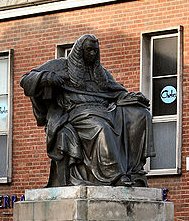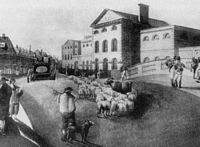
Statue of Judge Tindal, Chelmsford High Street.
Persecution and Sufferings
Post-civil war England in the mid-seventeenth century was a bad time to found a radical religious group, and the Quakers were seen by the state, clergy, and judiciary as yet another anti-establishment group. In Chelmsford library there is a copy of the Quarter Sessions Order Book 1651-1661 which contains a summary of the judicial and administrative business that had been transacted in the court during that period. An entry for 15 July 1656 is headed "QUAKERS":
"Whereas this Court doth take notice from divers partes of this Country That many idle, seditious and evil disposed persons doe travaile and walk from County to County and from place to place propagating and spreading certain obdurate and damnable opinions and delusions derogatory to the House of God and destructive to men's soules, subverting the principles of Christianity and seducing and withdrawing many persons from their due obedience to the good Government of the Nation, and that many such persons doe in sundry partes of this Country frequently assemble and gather themselves together drawing unto them many other persons suiting their evil disposition soe that multitudes of such persons doe often appear in the Country to the terror of good and peacable people and disturbance of the publique peace And also divers persons minding and desiring to hinder and obstruct the due worship and service of Almighty God doe often enter into publique assemblies of the good people of the Country as well as upon the Lords Dayes as other days --------- and doe there greatly disturb such Assemblies and reproach, traduce and highly abuse with many invective railings and other approbious speeches the Ministers and dispensers of God's word and other of God's people ----- This Court doth think fitt and doth order and command that the Chief Constables of the severall hundreds in this County doe forthwith make out their precepts to the petty Constables of the severall parrishes and places within their respective hundreds Straitly charging and commanding them that they use all possible diligence to apprehend all such evill disposed persons that shall or may bee found within this County -------------"
Worse was to come....
- In 1662 the Quaker Act provided penalties for those opposed to taking oaths.
- In 1664 the Conventicle Act banned all religious meetings other than those of the established church.
Quaker meetings were asked to supply the Monthly Meeting with written answers to a number of questions, some of which were concerning adherence to the Quaker Discipline. By collating these replies, an annual picture of the state of the Quaker community could be gained. From the 1682 minute book of Mid-Essex Quakers, the queries read:
(1) What present the prisoners?
(2) How many discharged since last year, when, how?
(3) How many died prisoners?
(4) How many meeting houses built, and what new meetings settled?
(5) How many publick friends died, and when?
(6) What is the state of your meeting?
(7) Do friends [Quakers], by example and precept, endeavour to train up their children, servants, etc in plainness of speech, behaviour and apparel?
(8) Are you faithful against tythes?
(9) Do you stand clear in our testimony against defrauding the King and his customs duties, or excise, or in dealing in goods suspected to be run?
(10) How are the poor provided among you, and what care is taken for educating their offspring?
(11) Do you bear a faithful testimony against bearing arms, and paying trophy money, or being in any manner concerned in the militia, in privateers, letters of marque, armed vessels or in dealing in prize goods as such?
It was not until 1689 that some relief came with the passing of the Toleration Act, which resulted in the release of almost 15,000 imprisoned Quakers. Some 450 had already died while in prison. However, dissenters were required to register their meeting locations and were forbidden from meeting in private homes

View of old goal at Chelmsford by stone bridge
In the early minutes of Witham Monthly Meeting there are many mentions of the sufferings which early Quakers endured. Imprisonments for refusing military service. Imprisonments for taking part in Quaker Meetings. Imprisonments for refusing to swear an oath, take the oath of allegiance or even refusing to remove one's hat in court.
In 1677, George Fox recorded in his Journal that on a visit to Chelmsford most local Quakers were in prison - this was the old prison near the stone bridge - but were able to negotiate permission to leave the prison in order to meet with him.
Since a belief in the equality of all men is central to the Quaker faith, refusal to removal one's hat as a mark of respect to another was widely exercised by Quakers; as was the refusal to swear an oath. Since truth and honesty in all dealings were also core to Quakerism, taking an oath to speak the truth implied that you did not always do so! This refusal to swear oaths had serious implications for employment since, as a consequence, access was barred to universities, parliament, and the legal professions. In court, refusal to remove a hat or swear an oath was seen as contempt of court, and a quick route to imprisonment - as James Parnell had discovered to his cost.
A third source of confrontation with the State was the refusal of Quakers to pay dues, such as tithes, to the established Church. Tithes were a yearly sum used to support the local clergy. Quakers argued that since the clergy and their churches were irrelevant to them they would not pay. Refusal to pay Church dues led to courts ordering seizure of goods in payment, known as distraint, a process which often resulted in poverty, or imprisonment. There are long lists of goods and chattels taken for tithes - farm animals, corn and other crops, tools, drapery, ironmongery, furniture, etc, etc - and since the value of the goods taken and the amount of the tithe is fully set out, these lists are now valuable social items of history and help to give a picture of the times. The records for Mid-Essex Quakers show that as late as 1850 distraint for non-payment of tithes is still high, being £1,537 (£90,000 today).
Another aspect of the distraint for tithes which comes out in the records, is that since the bailiffs always took more than the value demanded, there was usually a balance when the goods were sold. This surplus was brought back and given to the person concerned. But Quakers refused to take it, on the grounds that the goods were stolen, and they could not handle the proceeds of theft.
This caused many a headache to the authorities - such as Judge Tindal, whose statue is outside the Shire Hall in Chelmsford, especially when Quakers coupled his name with stolen goods!
It was not until the 1936 Tithes Act, that tithes were dealt with in a manner acceptable to Quakers!
